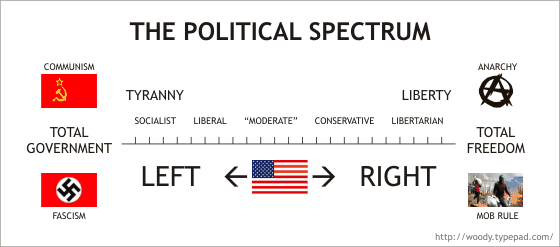The leftist rag the KOS is usually wrong but on this one they’re not even close. The start out with the leftist version of the political spectrum. From the article.
“Fascism is usually placed on the far right within the traditional left/right political spectrum.”
The author obviously doesn’t have a clue about the origins of the political spectrum.
Historical origin of the terms
So actually it was totalitarianism on the right and and freedom on the left. Of course the modern left has flipped sides on that one as the support a strong overbearing central government. A more correct depiction of the left right political spectrum would be this one.

The author got part of Fascism correct but only part.
Well Mussolini never denounced socialism, he and a few other Syndicalist socialist were booted from the party for wanting to use WWI to further the cause of socialism.
Impassioned Socialist
In 1902, Benito Mussolini moved to Switzerland to promote socialism, and quickly gained a reputation for his magnetism and remarkable rhetorical talents. While engaging in political demonstrations, he caught the attention of Swiss authorities and was eventually expelled from the country. In 1904, Mussolini returned to Italy and continued promoting a socialist agenda. He was briefly imprisoned and, upon release, became editor of the organization’s newspaper, Avanti (meaning “Forward”), which gave him a larger megaphone and expanded his influence.
The Break with Socialism and Rise to Power
Sounds an awful lot like the roots of Progressivism. Like the progressive movement Mussolini blended Syndicalist (Socialism) with nationalism. As one of the early progressive’s Herbert David Croly.
“Croly was one of the founders of modern liberalism in the United States, especially through his books, essays, and a highly influential magazine founded in 1914, The New Republic. In his 1914 book Progressive Democracy,Croly rejected the thesis that the liberal tradition in the United States was inhospitable to anti-capitalist alternatives. He drew from the American past a history of resistance to capitalist wage relations that was fundamentally liberal, and he reclaimed an idea that Progressives had allowed to lapse – that working for wages was a lesser form of liberty. Increasingly skeptical of the capacity ofsocial welfare legislation to remedy social ills, Croly argued that America’s liberal promise could be redeemed only by syndicalist reforms involving workplace democracy.”
As a matter of fact progressive Teddy Roosevelt gave a speech on this blending of syndicalist (socialism) and nationalism in his “New Nationalism” speech over 100 years ago. As a matter of fact Mussolini’s actions were highly praised by the left in America.
Economist and Historian Thomas Sowell has written on the subject.
As a matter of fact fascism is socialism with the illusion of private ownership.
“As an economic system, fascism is socialism with a capitalist veneer. The word derives from fasces, the Roman symbol of collectivism and power: a tied bundle of rods with a protruding ax. In its day (the 1920s and 1930s), fascism was seen as the happy medium between boom-and-bust-prone liberal capitalism, with its alleged class conflict, wasteful competition, and profit-oriented egoism, and revolutionary Marxism, with its violent and socially divisive persecution of the bourgeoisie. Fascism substituted the particularity of nationalism and racialism—“blood and soil”—for the internationalism of both classical liberalism and Marxism.
No one could ever put it as eloquently as Ronald Reagan.
















Look who first invented the Passive smoking Fraud
Hitler’s Anti-Tobacco Campaign
One particularly vile individual, Karl Astel — upstanding president of Jena University, poisonous anti-Semite, euthanasia fanatic, SS officer, war criminal and tobacco-free Germany enthusiast — liked to walk up to smokers and tear cigarettes from their unsuspecting mouths. (He committed suicide when the war ended, more through disappointment than fear of hanging.) It comes as little surprise to discover that the phrase “passive smoking” (Passivrauchen) was coined not by contemporary American admen, but by Fritz Lickint, the author of the magisterial 1100-page Tabak und Organismus (“Tobacco and the Organism”), which was produced in collaboration with the German AntiTobacco League.
That’s fine company are so called public health depts. keep with ehh!
History can shed so much lite on todays own movement it just amazes the mind………..
Hitler Youth had anti-smoking patrols all over Germany, outside movie houses and in entertainment areas, sports fields etc., and smoking was strictly forbidden to these millions of German youth growing up under Hitler.”
Something about lil corporals always becoming dictators! Lol